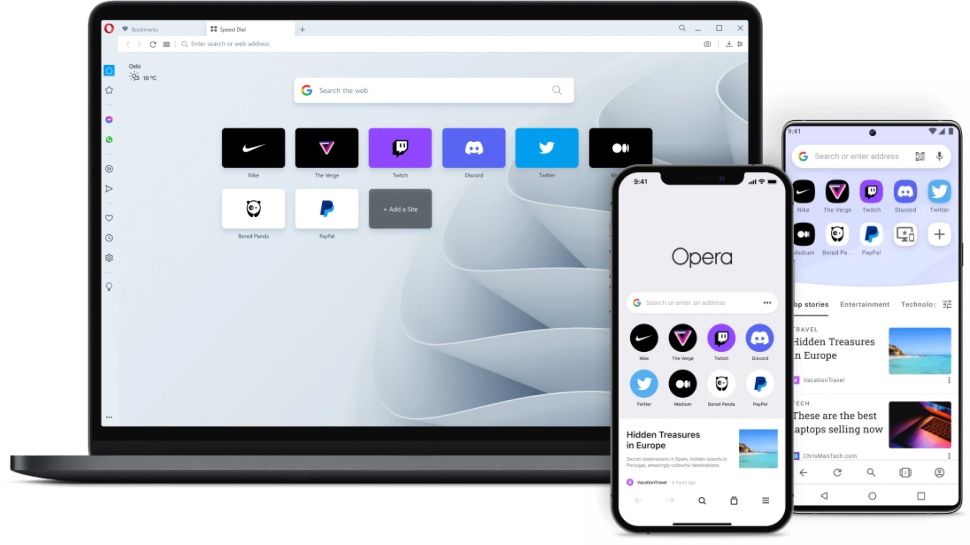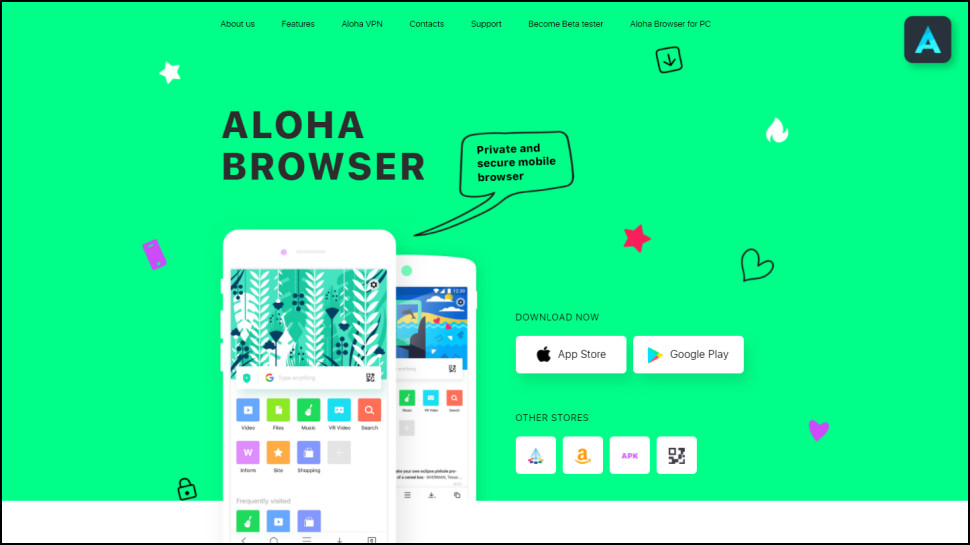Best browsers with built-in VPN
The best browsers with built-in VPN offer quick, hassle-free protection for all your browsing activities

Sign up for breaking news, reviews, opinion, top tech deals, and more.
You are now subscribed
Your newsletter sign-up was successful
You might not know this, but some web browsers come with a built-in VPN app. They offer an alternative way to protect your web browsing from anyone who might try to snoop on your online activities. They're a simple alternative for anyone new to VPNs, as there's no need to install a browser extension or a stand-alone VPN app, seeing as everything you need is included with the browser.
Browser-based VPNs do have limitations compared to their stand-alone counterparts. The biggest drawback is that they only protect your web browser and not the other apps on your device. What's more, they won't deliver the security, performance, or unblocking abilities of some of the best VPNs, such as industry leaders ExpressVPN or NordVPN.
VPN browsers are simple to use, usually free, and often don’t require you to sign up for an account to use them. If all you’re looking for is something to add a little extra security to your web browsing, then a VPN browser could be the right choice for you. We’ve highlighted four that we think are worth a look.
The best browsers with built-in VPN
Why you can trust TechRadar
The best built-in browser VPN
Reasons to buy
Reasons to avoid
The Opera web browser isn’t the most well-known, but it’s lasted longer than some, with the first version coming out back in 1995. Over the years, it became the browser of choice for web developers thanks to its adherence to web standards such as CSS, unlike other companies that often used custom versions.
In 2016, the company released a new version of the browser with a VPN client baked right into it, no separate app required, and OperaVPN shines in its simplicity. You access via the small “VPN” icon next to the address bar. You’re then presented with the usual big connect button, and a single click will launch the VPN.
Beneath that is the drop-down with the four different connection options, which will show your chosen location and your new IP address. The other settings for the VPN are accessed via a rather tiny cog icon that takes you to the settings menu. There is also a paid “Pro” version you can sign up for, which offers additional countries, more servers, and protection for your whole device and not just the web browser.
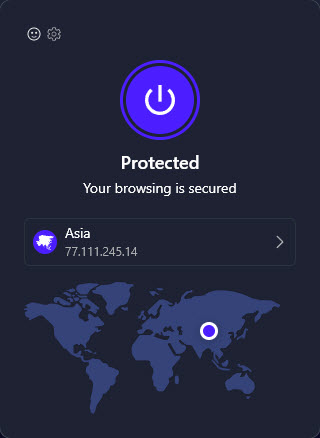
One big reason for using a VPN is to access geo-locked content in other countries, and while OperaVPN Pro is competent when it comes to unblocking streaming sites around the world, we can’t say the same about the free version. In our testing, it failed to play any content on Amazon Prime Video, couldn’t unblock Disney+ or the BBC iPlayer, and attempts to access Paramount+ led to a screen telling us that the service wasn’t available wherever we were in the world.
The biggest issue with OperaVPN Free is that the quality of the connection massively varies depending on the time of day. Our testing was carried out on a 1 Gb fiber connection in both the morning and the evening, and we saw hugely different results.
Testing the three different locations, we found that the Asian location gave us a top download speed of 249 Mbps, while the lowest result we got was a meager 2.06 Mbps download.
The European and American locations were both equally as inconsistent, with top download speeds of 380 Mbps and 136 Mbps, respectively, with the worst results returning download speeds of 13.76Mbps for Europe and 2.40Mbps for the USA. Ultimately, this makes it difficult to recommend for any serious HD or 4K streaming.
A VPN browser aims to offer a convenient way to encrypt your web browsing, and OperaVPN does succeed in this. It’s a perfectly respectable offering if all you’re looking to do is add an extra layer of security. The problem, though, is that other stand-alone free VPNs are as simple to use, offer faster download speeds, more features, and they protect all your other apps as well.
Best secure built-in browser VPN
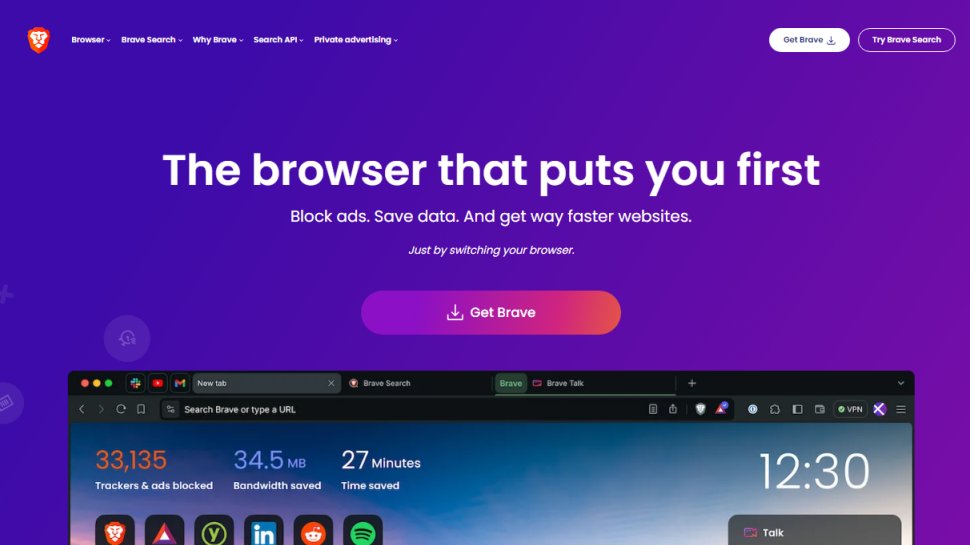
2. Brave
Our expert review:
Reasons to buy
Reasons to avoid
Unlike our other top picks, the Brave browser does not have a free VPN option. There is a 7-day free trial, but only after you sign up for a subscription plan, which you must then cancel before the week is out.
It’s also quite an expensive option, charging either 10 USD per month or 100 USD per year, which is vastly more expensive than the best cheap VPN providers such as Proton, Windscribe, Surfshark, or Cyberghost.
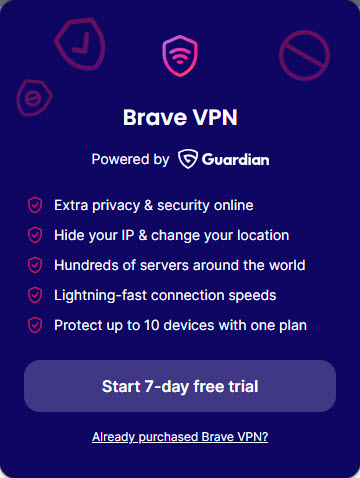
The VPN is accessed through a small shield icon set in the top right of the browser window, near where the extensions are pinned, and when it's connected, a small tick mark indicates the added protection.
Clicking on the VPN icon brings up a window that shows a slide button to connect, and beneath that, the country/server you are connecting to.
There is a settings icon, but there are no VPN settings that can be changed. As with most VPN browsers, you can’t choose your protocol or encryption, and there are no added security or privacy features to tweak. Instead, you can view your subscription, raise a ticket with support, or check out the Brave VPN website.
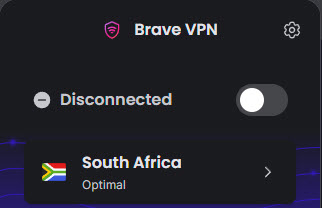
In terms of functionality, Brave VPN offers 10 simultaneous connections, allowing you to install and use it on a rather generous number of devices at once.
It also offers far more servers than other VPN browsers, spanning 40 different regions, but that’s because it’s a premium pick. In our testing, most servers averaged download speeds around the mid-200 Mbps, which is far slower than premium VPN clients, but more than enough for streaming HD and 4K content as well as online gaming, though it was a hit-and-miss affair when it came to streaming content platforms.
We carried out our testing using multiple locations and were able to access and play content on both Prime Video and the BBC iPlayer, but Disney+ and Paramount+ both gave us error messages or failed to load at all.
Another thing that sets Brave VPN apart from the crowd is that it’s one of the few VPN browsers to have an independent third-party audit. We’re always pleased to see and audit, as it builds confidence in a provider’s adherence to a no-logs policy.
The biggest issue with Brave’s built-in VPN is that it’s a feature-light offering that charges far too much money compared to stand-alone VPN providers.
Best privacy toolkit included in a built-in browser VPN
3. Aloha Browser
Our expert review:
Reasons to buy
Reasons to avoid
Aloha is like Brave in that it’s built on Chromium, making it very similar to Google’s Chrome browser, which makes them both a good choice for anyone looking to move from Chrome to something more secure and privacy-focused.
As with Brave and Opera, the VPN is easily accessed by a small shield-shaped icon set next to the address bar.
There’s no additional pop-up window here, no big power button or list of countries to click on. To get connected, users simply click on the VPN icon and then click on it again to disconnect. The icon turns blue when the VPN is connected and gray when it’s disconnected. Free users are automatically connected to whatever Aloha thinks is the fastest server. In our testing, this resulted in our being connected to a server in Moldova.
The Aloha VPN is different from the others in this list in that if you click away from the browser for any reason, then, after 60 seconds, the VPN automatically disconnects with a message that the “VPN has been disconnected. For basic accounts, VPN only works in Aloha Browser”.

The overall spread of features is pretty basic, though Aloha does have its own built-in ad blocker, which worked quite well.
The "TrafficMask" feature is another standout that obfuscates your connection and hides the fact you’re using a VPN at all. There is a premium subscription version of the browser available as well, too, with additional browser features and more servers.
In our testing, Aloha returned download speeds just over 200 Mbps, which is slower than a lot of stand-alone VPN providers, but fast enough for streaming HD and 4K content as well as online gaming. The biggest issue with this, unfortunately, is that Aloha didn’t work with almost any of the streaming services we tried.
We were able to access and play content on Prime Video, though we received a warning message that the browser we were using didn’t support HD content. BBC iPlayer could see that our IP address wasn’t based in the UK, displaying an error message, and both Disney+ and Paramount+ routed us to webpages stating that their service wasn’t available in our region.
Aloha claims to be a no-logs VPN provider and that it has been audited by the Leviathan Security Group, but it doesn’t publish the results of this audit on its blog or in its knowledge base. Instead, you need to dig into the Press Kit to find it. On review, this audit doesn’t appear to address any no-log claims that Aloha makes; it’s a specific audit of the security features of the iOS version of the client.
Checking the terms of service and the privacy policy, we found no specific mention of logging there either, so we can only conclude that any claims that Aloha doesn’t keep logs need to be taken with a very large pinch of salt.
Best streaming built-in browser VPN
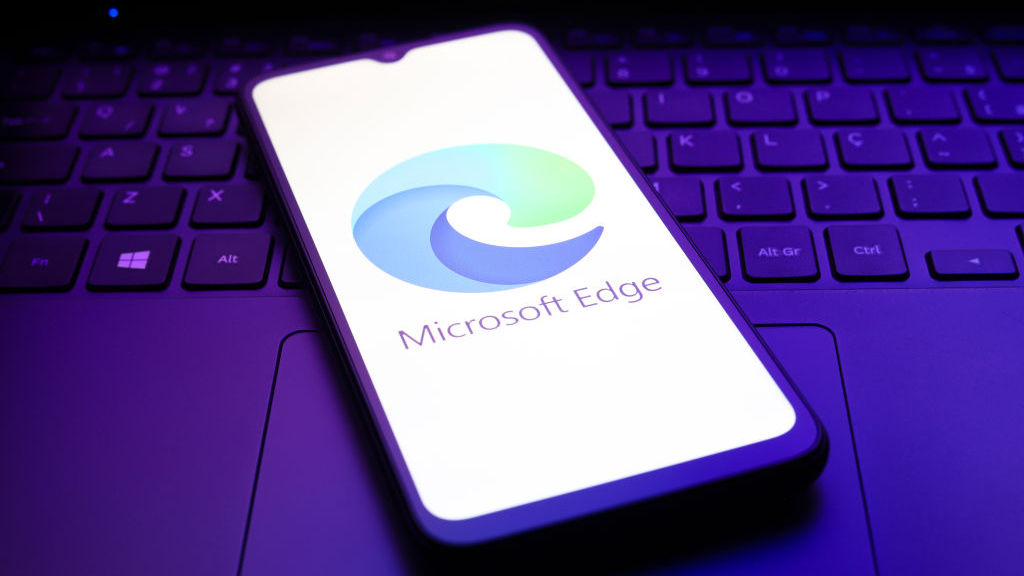
4. Edge
Our expert review:
Reasons to buy
Reasons to avoid
You might not realize this, but Microsoft’s Edge browser comes with a VPN built in. Microsoft doesn’t do a lot to draw attention to it, hiding it away within a sub-menu of a sub-menu and not even calling it a VPN. Instead, they call it Microsoft Edge Secure Network, which isn’t the catchiest nickname.
The icon only shows up once you dig into the settings and turn on Secure Network. It’s set just to the right of the address bar, where the extensions go, and looks like a little shield. The icon doesn’t change color to show if Secure Network is running or not, which means that if you disable it for any reason, you can easily forget to enable it again.
It’s not particularly user-friendly, however, as there’s no easily accessible button or obvious icon to press to launch the VPN. Instead, you need to click into your browser settings, then into Privacy, search and settings, then finally into Security, and when you scroll right down to the bottom, you finally see Secure Network.
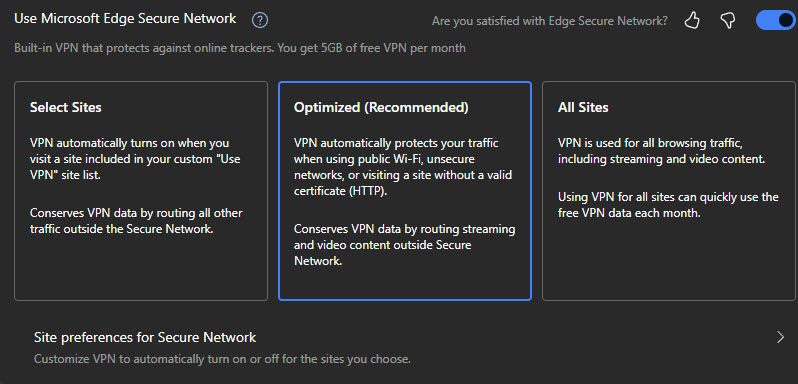
There are three options here - Select Sites, Optimized, or All Sites. This means that you can have the VPN automatically kick in for specific designated sites or when joining public Wi-Fi networks. Alternatively, you can also tell the VPN to run all the time, for every site.
Choosing the “All Sites” option will likely mean you’ll rapidly run out of available bandwidth, however, as it’s limited to a stingy 5 GB of traffic per month. That's half of what the majority of the best free VPNs offer (like Windscribe).
It can be set to ignore streaming traffic to help protect your bandwidth, which is good, and we were surprised to find in our testing that it worked with streaming sites including Prime Video, Disney+, and Paramount,+. Unfortunately, it’s useless for accessing content in other countries, as there are no options to choose a VPN server.
There are very few server options at all, actually, and no way to select which VPN protocol you want to use. Instead, Edge uses Cloudflare’s implementation of WireGuard. Perhaps the biggest issue we have with the VPN is its unclear logging policy and practices.
If you dig into Microsoft’s documentation, you'll find the following statement - “To provide access, we store minimal support data and access tokens which are only retained for the duration of the required service window. A Microsoft account is required to access Microsoft Edge Secure Network to track the amount of Secure Network data is used each month.“
As well as collecting logs, Edge cheerfully leaks your real-world location everywhere unless you go into the Edge browser settings to specifically turn off location access. It did pass both IP and WebRTC leak tests with flying colors, though.
It’s a strange offering compared to the other VPNs on this list, and not one we would recommend to beginners or to the privacy-conscious, but for those who only need a VPN for specific sites, or for a short space of time, it works surprisingly well.
Other VPN browsers
Maxthon
The Maxthon browser isn’t one that we recommend due to the specific VPN it comes bundled with – BrightVPN.
When you install the VPN, which is an optional part of the Maxthon install, it asks permission to use your internet connection – but it’s not clear from the install prompt what it’s actually doing.
“To use BrightVPN, you are allowing Bright Data to occasionally use your device’s free resources and IP address to download public web data from the Internet.“
If you disagree, it returns you to the install page. The installer says you can opt out anytime but, during installation, you have to say yes to continue the process. So, when it says you can “opt out,” it really means “you can opt out by not using our product”.
You can somewhat limit what kinds of companies might be using your web connection (to a maximum of three), but you can’t completely stop it.
These vague details about what these unspecified companies might be doing with your internet connection are accompanied by misspellings and bad grammar that don’t give the impression that it's a professional organisation that respects its users. Examples from the installer include “Send a feedback”, “Bright VPN does not require sing up”, and “Ethitcal concerns”.
You can find additional information about BrightVPN on the company website, but even then, it’s couched in very general terms. You will never know for sure what companies might be using your internet connection or what they might be using it for, and that’s a privacy risk we’re just not comfortable with.
Epic Browser
Epic is a browser that certainly takes user privacy seriously, with an encrypted proxy baked into the browser as well as an impressive number of other privacy-related features, so why isn’t it one we specifically recommend?
The biggest issue for us is that the company blog and social media were last updated in 2023, and there doesn’t appear to be any way to confirm the most recent update to the browser. The older a browser gets, the more likely it is to become vulnerable to exploits.
There have also been changes to the encrypted proxy function, and the company now openly states that it is collecting anonymized data and will share it with third parties in order to help fund the hosting of this network. Epic goes into more detail about this in the company’s privacy policy. We’re not saying that Epic is a bad product by any means, but we think there are now better options out there for those looking for a VPN browser.
UR Browser
The biggest issue with the UR browser is that we couldn’t get it to install on our test PC.
When you run the installer, you are presented with a splash screen with the message “Please wait, downloading content…” but then nothing happens. Eventually, it brings up an error message suggesting that there’s been an issue, but whether you click retry or cancel, nothing happens. The installer window doesn’t even close until you go into the Windows task manager and kill the process.
When you go to the UR Browser website, both the Press Page and Blog page are no longer working, and clicking on the Other Products or About Us links bring you right back to the same page for the browser and the company Privacy Policy was last updated in 2021, all of which paints a picture of a company that might not be in business anymore.
FAQs
Are VPN browsers safe?
All the VPN browsers we recommend here are perfectly safe and are ones that we’ve tested ourselves. While they will never offer the same levels of functionality or additional features as a stand-alone VPN product, they are all perfectly competent when it comes to protecting your web browsing.
What’s the difference between a VPN browser and a VPN app?
VPN browsers only protect the web browser and nothing more. A stand-alone VPN app will protect everything on your device, however, such as streaming media, social media, chat, and messaging. VPN apps will often come with additional features such as ad-blocking, malware blocking, antivirus software, and more.
What is the best VPN browser?
This is always a difficult question and there really is no definitive “best” option as each has pros and cons. The simplest answer is going to be whichever one works for your particular set of circumstances. We think that the four VPN browsers we recommend in this list are the best options available today.
We test and review VPN services in the context of legal recreational uses. For example: 1. Accessing a service from another country (subject to the terms and conditions of that service). 2. Protecting your online security and strengthening your online privacy when abroad. We do not support or condone the illegal or malicious use of VPN services. Consuming pirated content that is paid-for is neither endorsed nor approved by Future Publishing.
Sign up for breaking news, reviews, opinion, top tech deals, and more.

After graduating from Stirling University with a qualification in Education, Shaun accidentally fell into the technology sector in the late 1990's and has stayed there ever since, working for companies such as PSINet, IBM and ProPrivacy in a variety of roles from Systems Administration to Technical Writer. Being around since the birth of the modern internet, he's seen the way that technology has expanded to become an integral part of everyday life, and how people's understanding and ability to retain any kind of privacy has lagged behind.
Shaun is a strong believer in the rights of the individual to have their personal data protected and their privacy respected – a belief made all the stronger in an age of surveillance from both governmental bodies and private companies all around the world.
He spends his spare time cooking, riding his motorbike and spending far too many hours in Star Trek Online hunting Klingons and Borg.
